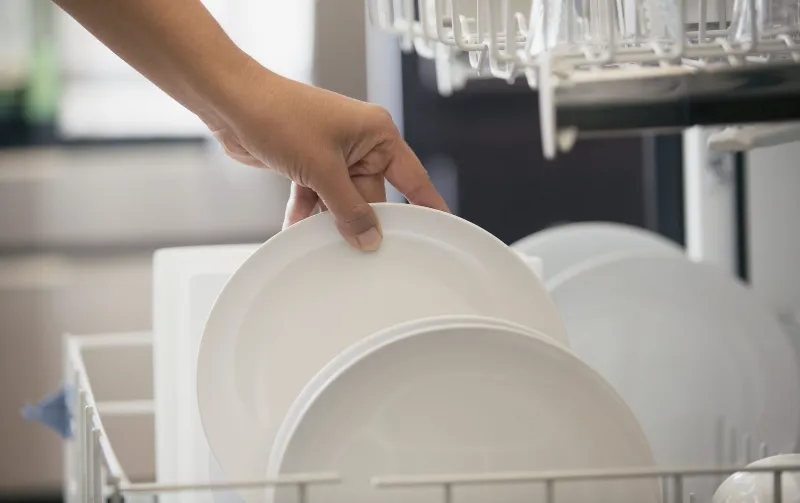Wooden utensils, non-stick pans, and knives are not dishwasher safe. Delicate glassware, cast iron, and insulated mugs should also avoid the dishwasher.
Ensuring the longevity and proper care of your kitchen items means recognizing which ones can withstand the vigorous environment of a dishwasher and which ones require a gentler touch.
It’s essential to know the distinct materials and items that don’t fare well with high heat, water pressure, and harsh detergents found in dishwasher cycles.
From wooden cutting boards that can warp and crack to the delicate crystals that can shatter or lose their clarity, the nuances of what makes something dishwasher-safe are critical.
This knowledge not only preserves the condition and effectiveness of your kitchenware but also maintains its aesthetic appeal and safe usage.
With an array of materials and kitchen items that demand special attention, it’s important to identify and hand wash those select items to ensure they remain in top shape.
Understanding these distinctions can make all the difference in caring for your kitchen investments.

Delicate Materials To Avoid
When it comes to maintaining the integrity and longevity of certain household items, the dishwasher might not be your ally.
Particular materials can suffer from the harsh environment within this kitchen appliance.
Some materials are too fragile or valuable to withstand the dishwasher’s robust cleaning cycle.
Not only can the heat and water pressure cause damage, but chemical reactions with dishwasher detergents can also tarnish or degrade these items.
Remembering which materials to avoid can save you from unwanted damage and preserve the beauty and function of your prized possessions.
Silver Or Silver-plated Items
Silver cutlery and silver-plated items carry a timeless elegance that can elevate any dining experience.
To maintain their lustrous sheen, it’s best to clean them manually.
In the dishwasher, silver reacts chemically with sulfur compounds in the detergent, causing discoloration and tarnishing.
Hand wash these precious items with a mild detergent and buff dry immediately to prevent water spots.
Crystal Or Delicate Glassware
Crystal glassware and delicate glasses are admired for their clarity and intricate designs.
These items can easily become etched or cracked in a dishwasher’s harsh conditions.
To prevent such damage, it’s advisable to wash them by hand using warm, soapy water.
Gently pat them dry with a soft cloth to protect their fragile beauty and structure.
Antique Or Hand-painted Ceramics
The charm of antique or hand-painted ceramics often lies in their unique artistry and historical significance.
Dishwasher cycles can strip away the paint and cause glazes to deteriorate, which is why these ceramics require a more tender touch.
Cleaning them by hand with a soft sponge and avoiding abrasive materials will help preserve their artistic value and physical integrity.
Items With Adhesive Components
Understanding what not to place in a dishwasher is essential to maintaining the integrity of your kitchenware.
A key category to be cautious with is items that include adhesive components.
These items are particularly susceptible to high heat and potent dishwasher detergents, which can cause the adhesive to weaken or dissolve, ultimately damaging the item or rendering it unusable.
Below, we explore specific items you should skip from the dishwasher and care for by hand to extend their lifespan and functionality.
Insulated Travel Mugs
Insulated travel mugs, especially those with double-walled construction, rely on adhesive materials to maintain their temperature-retaining properties.
Exposing these mugs to dishwasher conditions can lead to a breakdown of adhesives, subsequently ruining their insulation capacity.
This can cause them to become less effective at keeping your beverages hot or cold, and may even create leaks.
Nonstick Cookware
Nonstick cookware often contains adhesive elements that bond the nonstick coating to the metal.
Subjecting this type of cookware to dishwasher cycles can wear down the nonstick surface and cause peeling or chipping.
As a result, it’s best to gently hand wash these items to maintain the nonstick qualities and ensure your food continues to slide off easily.
Wooden Utensils With Glued Parts
Many wooden utensils have parts that are glued together, such as handles or decorative elements.
The hot water and detergents in dishwashers are not friends to these glued joints.
They can cause the glue to soften and break down, potentially leading to utensils coming apart.
Preserve your wooden kitchen tools by washing them by hand in mild soapy water and drying them promptly.
Electronics And Metal Items
Washing dishes after a delicious meal can be a hassle, but the convenience of dishwashers is something many have become accustomed to.
While they excel at cleaning cutlery and crockery, not all household items are fit for this appliance.
Electronics and metal items, in particular, need more meticulous handling.
Understanding what to keep out of your dishwasher is crucial to preserving the integrity of these items and ensures they continue to serve their purpose for years to come.
Smartphones And Tablets
Smartphones and tablets are integral parts of our daily lives, keeping us connected and informed.
However, exposing them to the humid environment of a dishwasher is a surefire way to damage their intricate electronics.
The high heat and water can wreak havoc on the sensitive components, not to mention the possibility of short-circuiting the battery.
Always keep your precious gadgets far away from the dishwasher.
Cast Iron Cookware
Cast iron cookware is a favored choice for chefs and home cooks alike, known for its heat retention and durability.
Yet, its enemy is rust, which can rapidly form when washed in a dishwasher.
Handwashing cast iron with mild soap and water, followed by thorough drying and seasoning with oil, is the best way to maintain its non-stick surface and prevent corrosion.
Aluminum Or Copper Kitchenware
Aluminum and copper kitchenware boast excellent thermal conductivity, making them popular for cookware and baking utensils.
Placing these metals in the dishwasher can lead to discoloration and oxidation.
The detergents can cause a dull finish and pitting over time, undermining the luster and functionality of these items.
Handwashing with a gentle detergent preserves the life and appearance of your aluminum or copper kitchenware.
Plastics And Other Non-dishwasher Safe Materials
While the dishwasher is the go-to solution for cleaning a multitude of kitchen items, certain materials can suffer from the high heat and harsh detergents used in the process.
Plastics, disposable aluminum foil pans, and unsealed wooden cutting boards are prime examples of kitchen essentials that require special care.
Let’s delve into why these items should stay out of the dishwasher to keep them in their best shape for as long as possible.
Plastic Food Storage Containers
Not all plastic containers are built to withstand the dishwasher’s environment.
The heat can warp or melt them, and if they don’t seal properly anymore, it’s goodbye to their food-preserving capabilities.
Top-rack placement can reduce risk, but it’s crucial to check the manufacturer’s recommendations before deciding their dishwasher’s fate. Here’s a quick guide:
- Check for a dishwasher-safe symbol: Usually a plate or glass with water droplets or simply the words “dishwasher safe”.
- If there’s no symbol, play it safe and wash by hand.
- Avoid placing plastic near the heating element as it can lead to warping or melting.
Disposable Aluminum Foil Pans
Convenient for cooking and storing food, disposable aluminum pans are not designed for the dishwasher.
Their thin structure can get bent or crushed, and they may leave behind gray residue that can be transferred to the next wash load.
Always opt for a gentle hand wash to maintain these pans’ integrity. The table format below shows why they should be kept out:
| Reason | Explanation |
|---|---|
| Structural Damage | High water pressure can deform thin aluminum. |
| Chemical Reaction | Dishwasher detergents may cause corrosion or discoloration. |
| Residue Risk | Gray aluminum residue might spread to other items. |

Wooden Cutting Boards With No Sealant
Wooden cutting boards add a warm, natural aesthetic to any kitchen, but their care is as important as their function.
Those without a protective sealant are particularly vulnerable to dishwasher damage.
The combination of heat, moisture, and detergent can crack and warp the wood, ruin its finish, and even cause it to split. Preserve your wooden cutting boards with these steps:
- Hand wash with mild soap and warm water.
- To disinfect, wipe with a solution of 1 tablespoon of bleach to a gallon of water.
- Dry immediately and thoroughly to prevent water damage.
- Regularly apply mineral oil to keep the wood from drying out.
Additional Items To Keep Out Of The Dishwasher
Welcome to the enlightening journey where we help you preserve the life and functionality of your kitchen essentials.
Understanding what not to place in your dishwasher is crucial in maintaining your items in their best condition.
While most people recognize the dangers of placing wooden spoons or delicate china in their dishwasher, there are other, less obvious items that should also avoid the confines of this kitchen appliance.
Let’s delve into additional items to keep out of the dishwasher.
Sharp Knives
Your collection of sharp knives may seem sturdy, but the dishwasher is their nemesis.
The harsh environment inside the dishwasher can dull the blades, compromising their sharpness and efficiency.
Furthermore, jostling amidst other dishes could result in nicks or damage to the blade edge.
To ensure longevity and optimal performance, always hand wash your quality knives with care.
Long-handled Items
Long-handled utensils such as ladles, stirring spoons, or serving forks might seem dishwasher safe due to their metal construction, but they pose a unique problem.
Their length may prevent the spray arms from rotating properly, leading to an ineffective wash cycle.
Plus, they could slip through the cracks and damage the dishwasher’s heating element. A quick hand wash is all they need to avoid these potential hassles.
Decorated Or Hand-painted Stemware
The elegance of decorated or hand-painted stemware should be preserved by keeping it out of the dishwasher.
The high heat and potent detergents can erode the intricate designs, causing them to fade or peel.
Always opt for gentle hand washing to maintain the pristine condition and sparkle of these delicate showpieces. Treat these treasures with the special care they deserve.
Let’s sum up with a quick reference list:
- Sharp knives – Hand wash only to maintain sharpness.
- Long-handled items – Risk the functionality of dishwasher’s arms, hand wash.
- Decorated or hand-painted stemware – High risk of damage, hand wash for preservation.
Frequently Asked Questions Of 20 Things That Are Not Dishwasher Safe
Can Wooden Utensils Go In The Dishwasher?
Wooden utensils may warp and crack; they should be hand-washed.
Is Hand-washing Better For Some Kitchenware?
Certain items, like sharp knives and crystal glasses, benefit from gentle hand-washing to preserve their quality.
What Materials Are Unsafe For Dishwashers?
Materials like cast iron, non-stick coatings, and insulated mugs should avoid dishwasher use to prevent damage.
How Can The Dishwasher Harm Delicate Dishes?
High heat and strong detergents can cause fading, chipping, or damage to delicate dishware.
Conclusion
Wrapping up, and understanding what can’t brave your dishwasher saves time and preserves your items.
Though dishwashers offer convenience, they aren’t suited for everything in your kitchen.
Check labels and when in doubt, opt to hand wash.
Remember this guide to keep your belongings in top shape and out of harm’s way.
